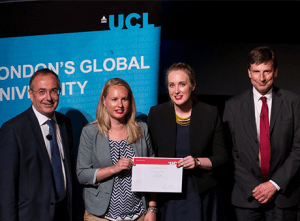Professional Services Conference
By uclzean, on 24 June 2014
The inaugural Professional Services Conference took place on Monday, 16 June. The afternoon consisted of a series of presentations and panel discussions followed by an awards ceremony for staff and teams nominated by their colleagues across the university.
Rex Knight, Vice-Provost (Operations), introduced the conference as a “celebration of work going on across the university”. Professor Anthony Smith, Vice-Provost (Education) said: “it’s all too easy for academic events to take precedent. This is an opportunity to say thank you to the unsung aspects of the institution.”
Over the past decade, there has been a 20% increase in staff and a 16% increase in student numbers and Knight continued “thanks to your extraordinary professionalism all would not be as it is without what you do”.
There were then presentations from Emma Todd and Alice Chilver (UCL Bartlett), co-founders of Astrea, the professional women’s network at UCL. Dr. Debbie Challis spoke about the exhibition, A Fusion of Worlds, at the Petrie Museum and funded by UCL Grand Challenges.
Finally, Bob Carey discussed the Strategic Leadership Programme and Steve Rowalt and Kate Cheney delivered their presentation on the UCL Masterplan 2011, which has overseen the current transformation of the Cruciform Hub – @ucl_crucitwit.
The Professional Services Awards consisted of five categories with nominations coming from a diverse range of staff across the university. Emma Todd, Strategic Communications Manager and Alice Chilver, Business Development Manager at the UCL Bartlett, won the ‘Empowered… confident and enabling’ award for their work in setting up Astrea.
Emma and Alice have created a network that provides a social and informal space that offers peer support – empowering and boosting the confidence of its members through events and training, and enabling members to work towards goals.
The winner of the ‘Excellent service… putting UCL’s goals and customer needs at the heart of our endeavour’ award was John Draper and his team.
John is the Divisional Head of Administration for UCL Psychology and Language Sciences (PaLs) and the UCL Faculty for Brain Sciences. The team is a vital and integrated part of the UCL academic community, who consistently provide excellent service across a range of activities including teaching and learning, finances, information technology and estates.
John’s team is made up of 80 people and supports a total of eight research departments. Their work, however, affects a much wider community.
Taking the award for ‘Innovation… to be creative and ambitious in all our endeavours‘ was Susie Chan and her team.
Susie is Exhibitions Manager in UCL Public Culture and Engagement. The creation of the Octagon gallery saw the transformation of an unremarkable thoroughfare into a world-class display case showcasing UCL’s research and reinstating the original vista to the Flaxman Gallery and Wilkins’s iconic dome.
Innovation characterised its construction, from the design through to the first exhibition. The team overcame real difficulties due to a contractual dispute, but remained true to the original vision and insisted on the highest quality.
Harry Dayantis, Media Relations Manager in UCL Communications and Marketing, walked away with the ‘Mutual respect…to maintain an inclusive environment in which all colleagues can flourish’ award.
In March 2014, the Media Relations team was contacted by many journalists looking to interview UCL cosmologist Dr Hiranya Peiris regarding the ‘Big Bang’ story. Dr Peiris, who was at the conference, appeared on Newsnight, alongside UCL Honorary Research Associate, Maggie Aderin-Pocock. The Daily Mail then suggested that Dr Peiris and Dr Aderin-Pocock were selected based on gender and birthplace because “Newsnight’s Guardian-trained editor, Ian Katz, is keen on diversity”.
Media Relations acted incredibly quickly to co-ordinate a response to uphold UCL’s commitment to mutual respect. The result sent a clear message throughout the university, the scientific community and beyond that UCL is an inclusive environment that not only fosters mutual respect, but also defends staff members’ rights to mutual respect at the highest level.
Without the team’s passion for mutual respect and equality, it is unlikely that a response would have been issued at all, let alone in such a high-profile and timely manner.
The final award, ‘Collaboration…putting UCL’s goals first by working in partnership’, went to Diran Solanke and his team.
Diran is Head of Research Contracts for Research Services, Finance and Business Affairs and Professional Services at UCL. Research Services is responsible for handling the financial, contractual and administrative aspects of UCL’s external research income – from submission of applications through to claiming funds from sponsors and finalising projects.
The merger of three large MRC units in August 2013 required a major collaboration between the three units and Research Services throughout 2013. By being open and professional, the team has established a good working relationship with the MRC, helping to ensure that the mergers have gone through relatively smoothly.
This good working relationship resulted in the clinical trials unit being keen to use the team’s legal expertise to provide cover during a staffing gap, following a resignation, and be involved in the recruitment and training of the replacement.
The afternoon ended with UCL President & Provost, Professor Michael Arthur, taking questions from the floor. “Ten months feels like 10 minutes”, he said, “I have never been as busy”.
Responding to a question on how we can emphasise the role that Professional Services play within the university, he said, “There is always tension between the academic side of the university and Professional Services. We need to aim to bring both sides together”.
When asked what the effect would be on the university if the UK withdrew from the European Union, he said: “It would be an absolute disaster” as research funding would be withdrawn, which has recently happened recently to institutions in Switzerland.
There were 485 registered attendees at the event and the Events team was applauded at the end for the considerable hard work that they put in to make the event such a success.
 Close
Close


